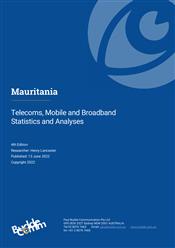Mauritania Telecoms Market Report
Telecoms, Mobile and Broadband - Statistics and Analyses

Mauritania completes national broadband backbone network
Mauritania’s small population and low economic output has limited the country’s ability to develop sustained growth in the telecom sector. Relatively low disposable income has restricted growth in the use of services, and thus of revenue which telcos can hope to gain from subscribers. In turn, this has impacted on their ability to invest in network upgrades and improvements to service offerings. This has been reflected in the repeated fines imposed against them by the regulator for failing to ensure a good quality of service. There are also practical challenges relating to transparency and tax burdens which have hindered foreign investment.
However, financial support has been forthcoming from the government as well as the World Bank and European Investment Bank. Their efforts have focussed on implementing appropriate regulatory measures and promoting the further penetration of fixed-line broadband services by improving the national backbone network, ensuring connectivity to international telecom cables, and facilitating operator access to infrastructure. Much progress has been made to improve internet bandwidth capacity, including the completion of a cable link at the border with Algeria, and the connection to the EllaLink submarine cable. In addition, the final stage of the national backbone network was completed in December 2021, which now runs to some 4,000km.
Mauritel maintains a virtual monopoly in the fixed-line sector, and there is little stimulus for new market entrants. Penetration of fixed telephony and broadband penetration is very low and is expected to remain so in coming years, though growth is anticipated following improvements to backbone infrastructure and the reduction in access pricing.
Most voice and data services are carried over the mobile networks maintained by the recently rebranded Moov Mauritel, Mattel, and Chinguitel.
Key Developments:
- Last section of Mauritania’s 4,000km fibre backbone network is completed;
- Mauritania improves international bandwidth through connecting to the EllaLink submarine cable system;
- Regulator awards LTE licenses to Moov Mauritel, Chinguitel, and Mattel;
- MNOs again fined for poor QoS;
- Mattel secures satellite backhaul connectivity for remote areas;
- Report update includes ITU data for 2020, operator data for Q1 2022, updated telecom Maturity Index and charts, recent market developments.
Companies mentioned in this report:
Moov Mauritel, Mattel, Chinguitel, Sudatel, Expresso Telecom, Tunisie Telecom
Related Reports
- Africa - Mobile Infrastructure and Mobile Broadband
- Africa - Mobile Network Operators and MVNOs
- Africa - Fixed Broadband Market - Statistics and Analyses
- Botswana - Telecoms, Mobile and Broadband - Statistics and Analyses
- Sierra Leone - Telecoms, Mobile and Broadband - Statistics and Analyses
- Niger - Telecoms, Mobile and Broadband - Statistics and Analyses
- Uganda - Telecoms, Mobile and Broadband - Statistics and Analyses
- Namibia - Telecoms, Mobile and Broadband - Statistics and Analyses
- Algeria - Telecoms, Mobile and Broadband - Statistics and Analyses
- Somalia - Telecoms, Mobile and Broadband - Statistics and Analyses
Share this Report
TMT Intelligence
A platform to scale your intelligence tasks
Monitor critical insights with our AI-powered Market Intelligence Platform gathering and analyzing intelligence in real time. With AI trained to spot emerging trends and detect new strategic opportunities, our clients use TMT Intelligence to accelerate their growth.
If you want to know more about it, please see:
Research Methodology
BuddeComm's strategic business reports contain a combination of both primary and secondary research statistics, analyses written by our senior analysts supported by a network of experts, industry contacts and researchers from around the world as well as our own scenario forecasts.
For more details, please see:
More than 4,000 customers from 140 countries utilise BuddeComm Research
Are you interested in BuddeComm's Custom Research Service?
Hot Topics
News & Views
Have the latest telecommunications industry news delivered to your inbox by subscribing to BuddeComm's weekly newsletter.